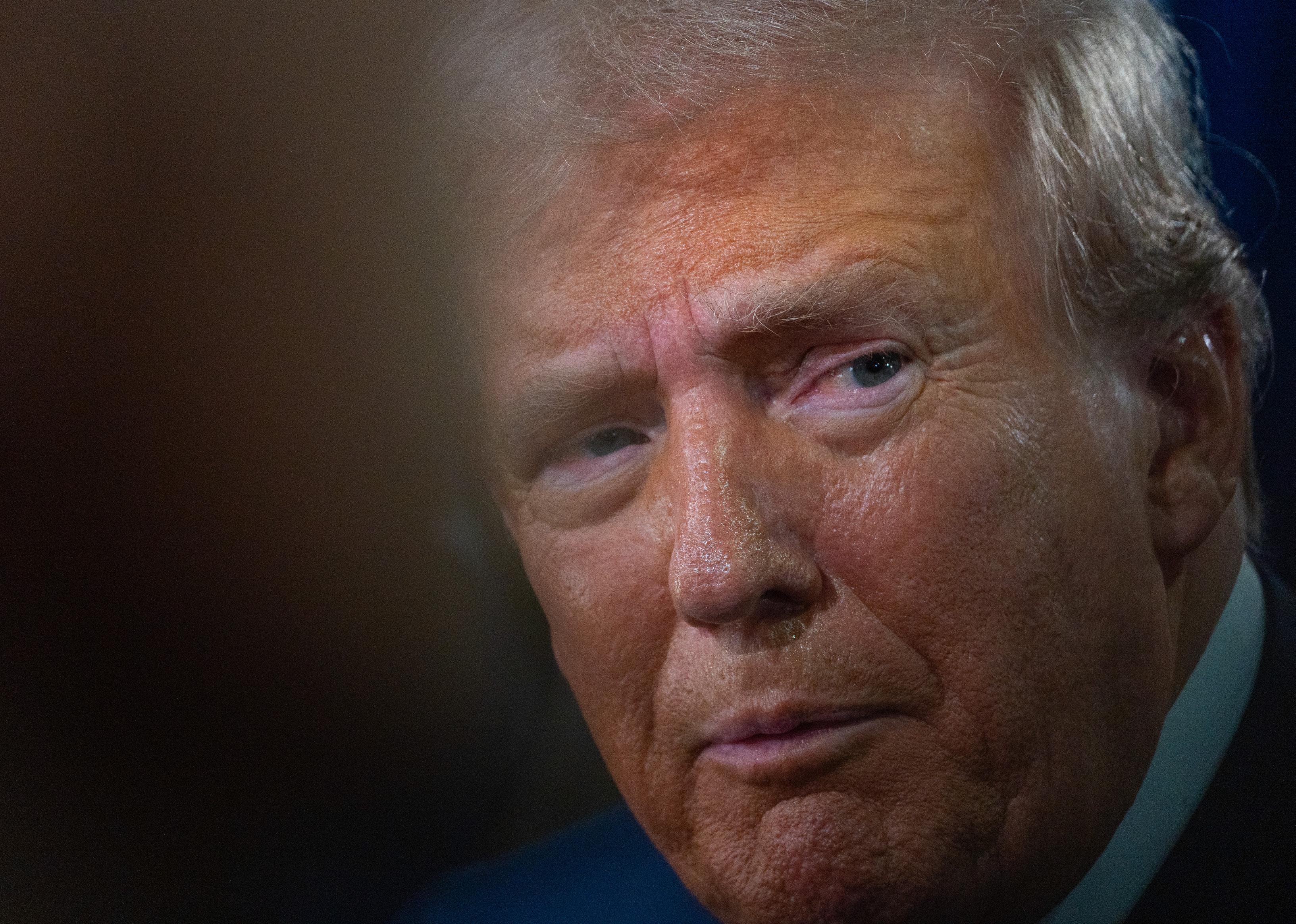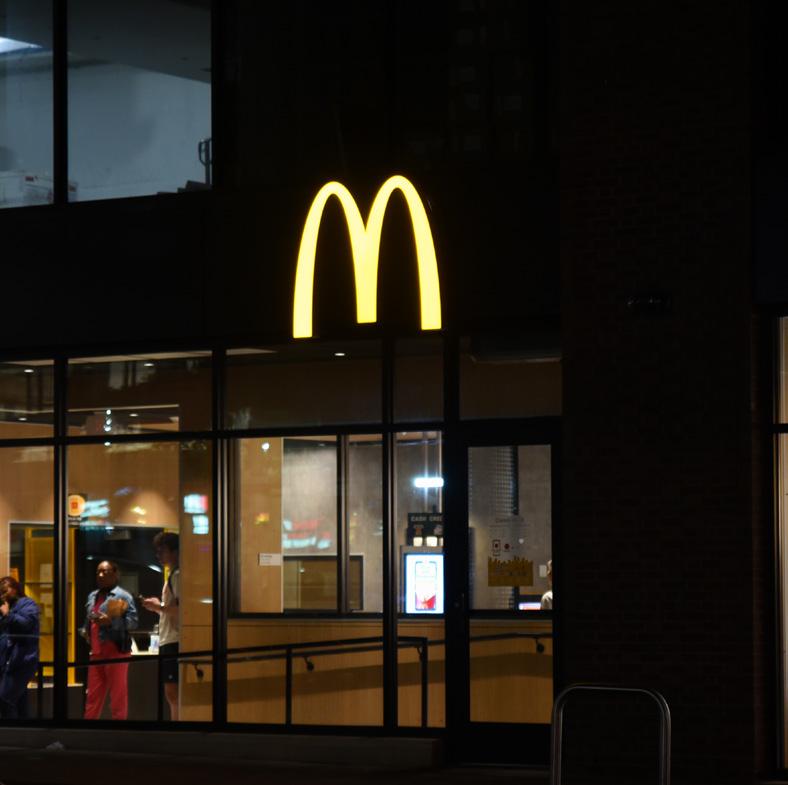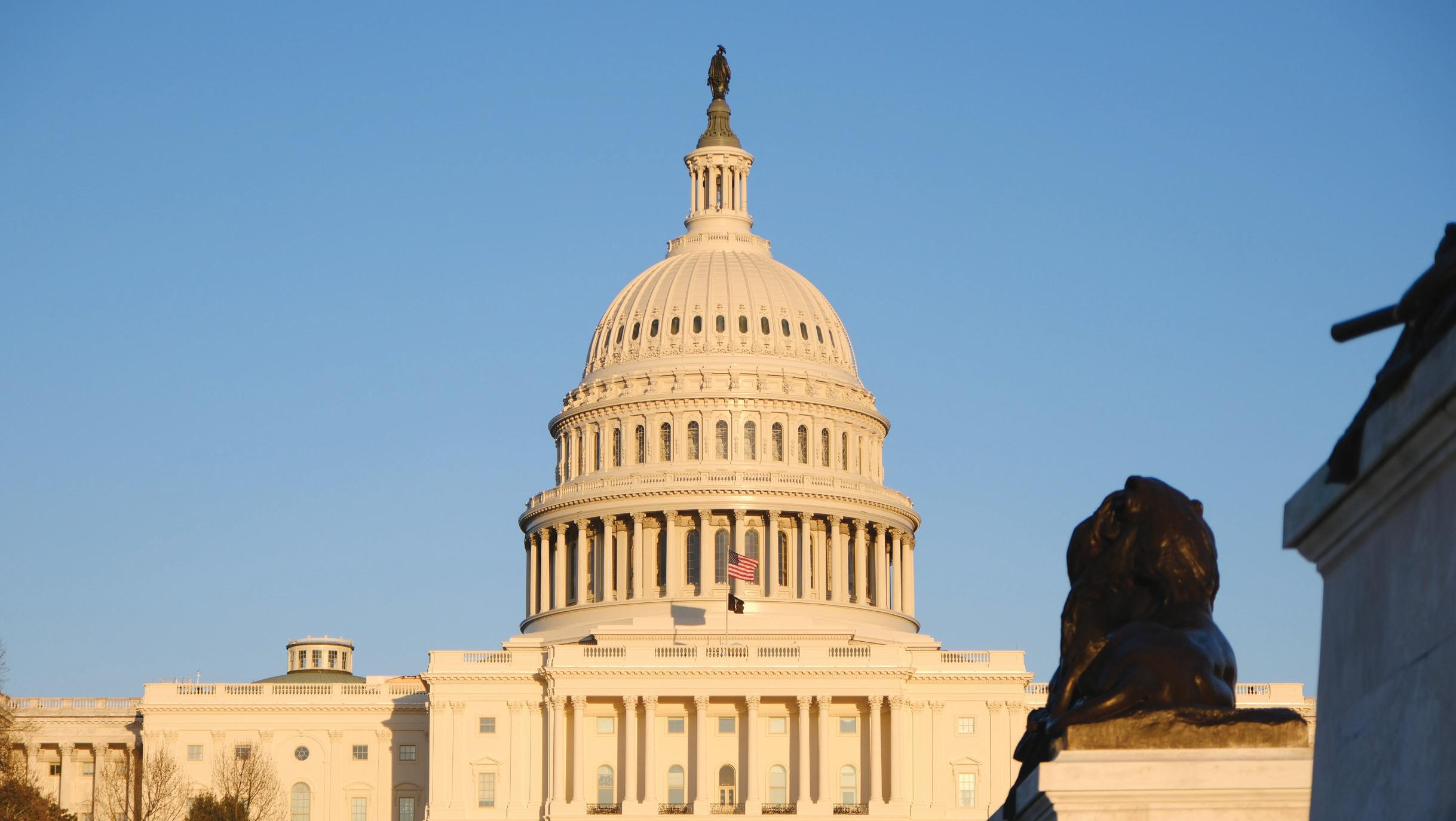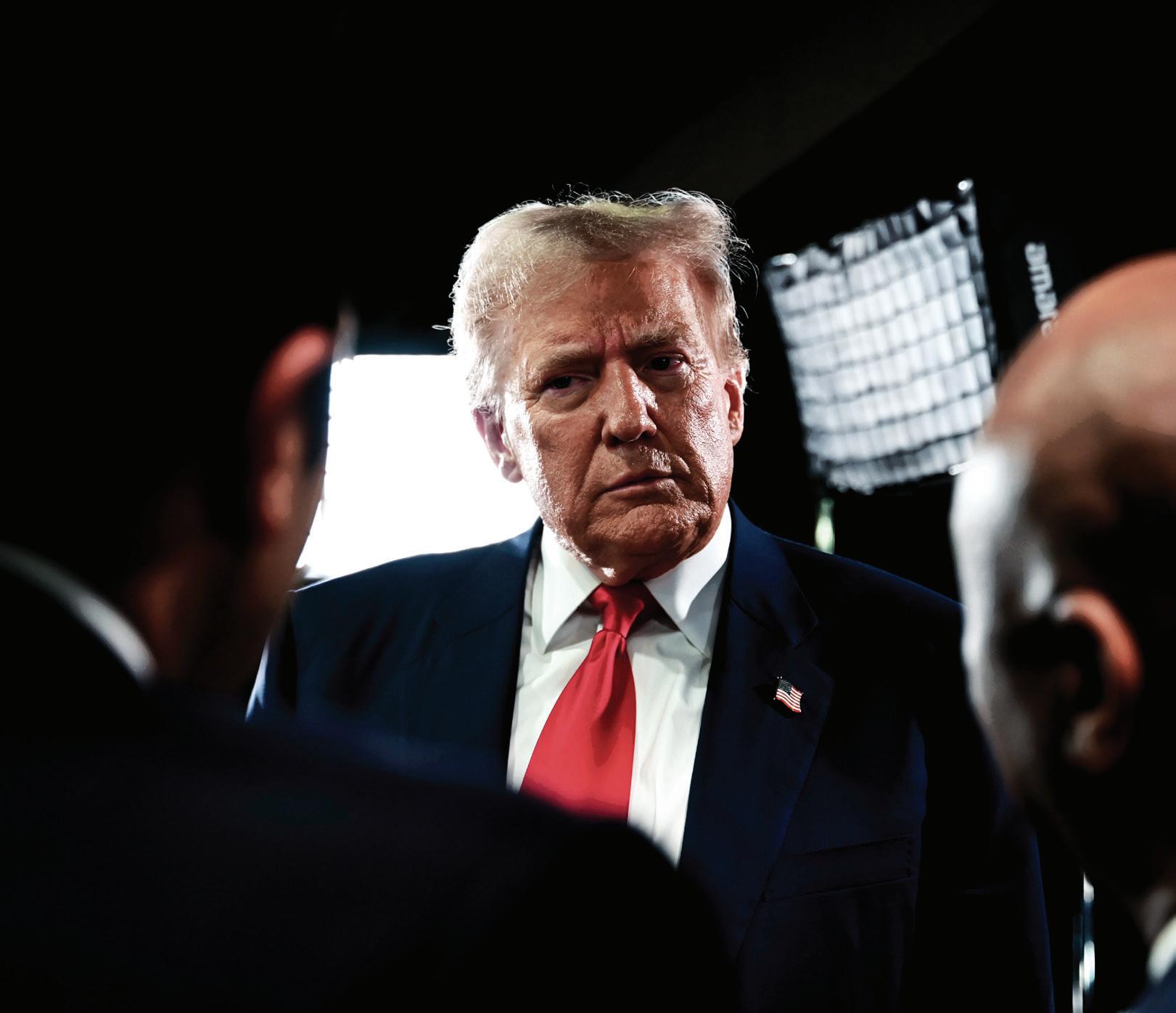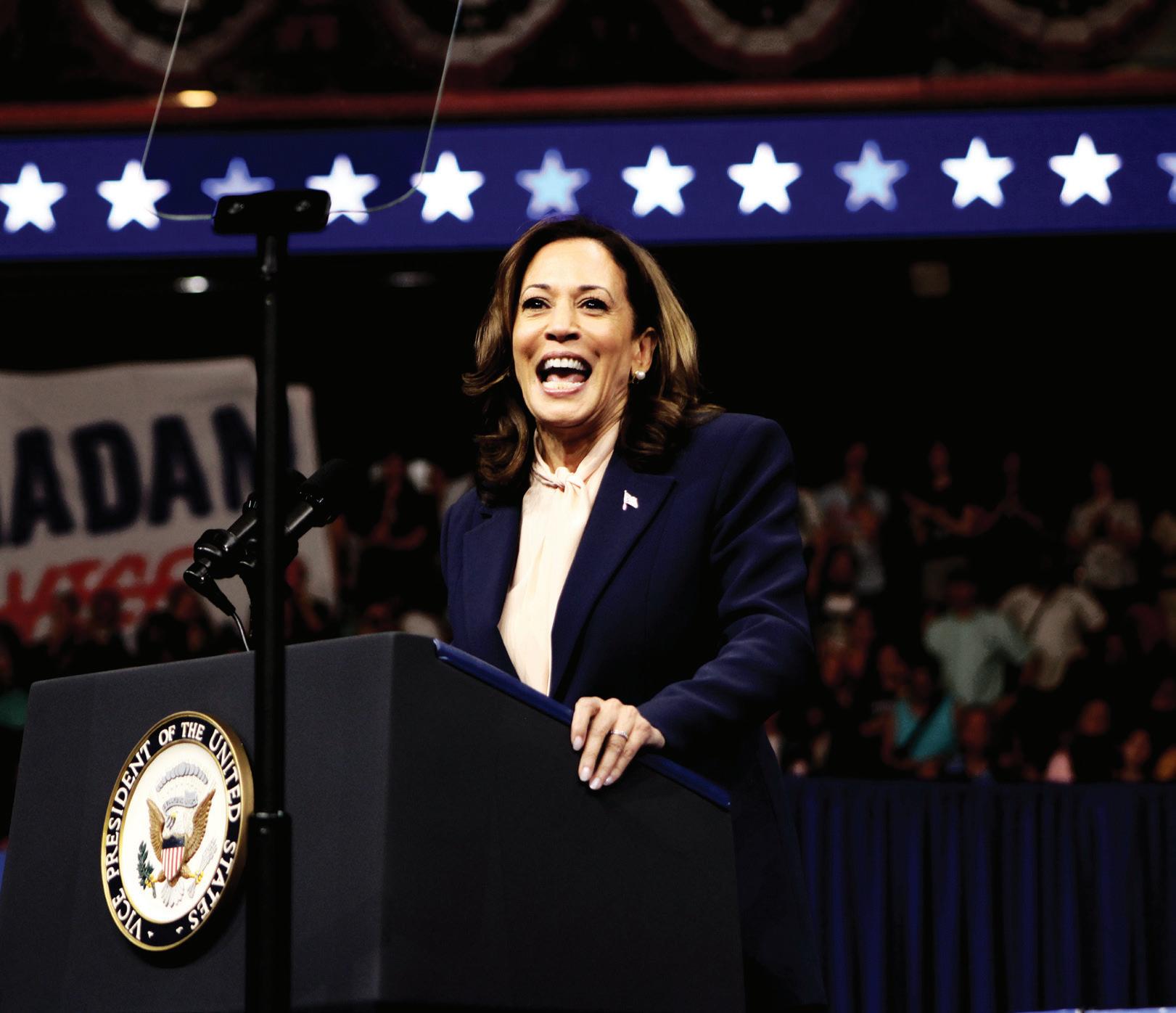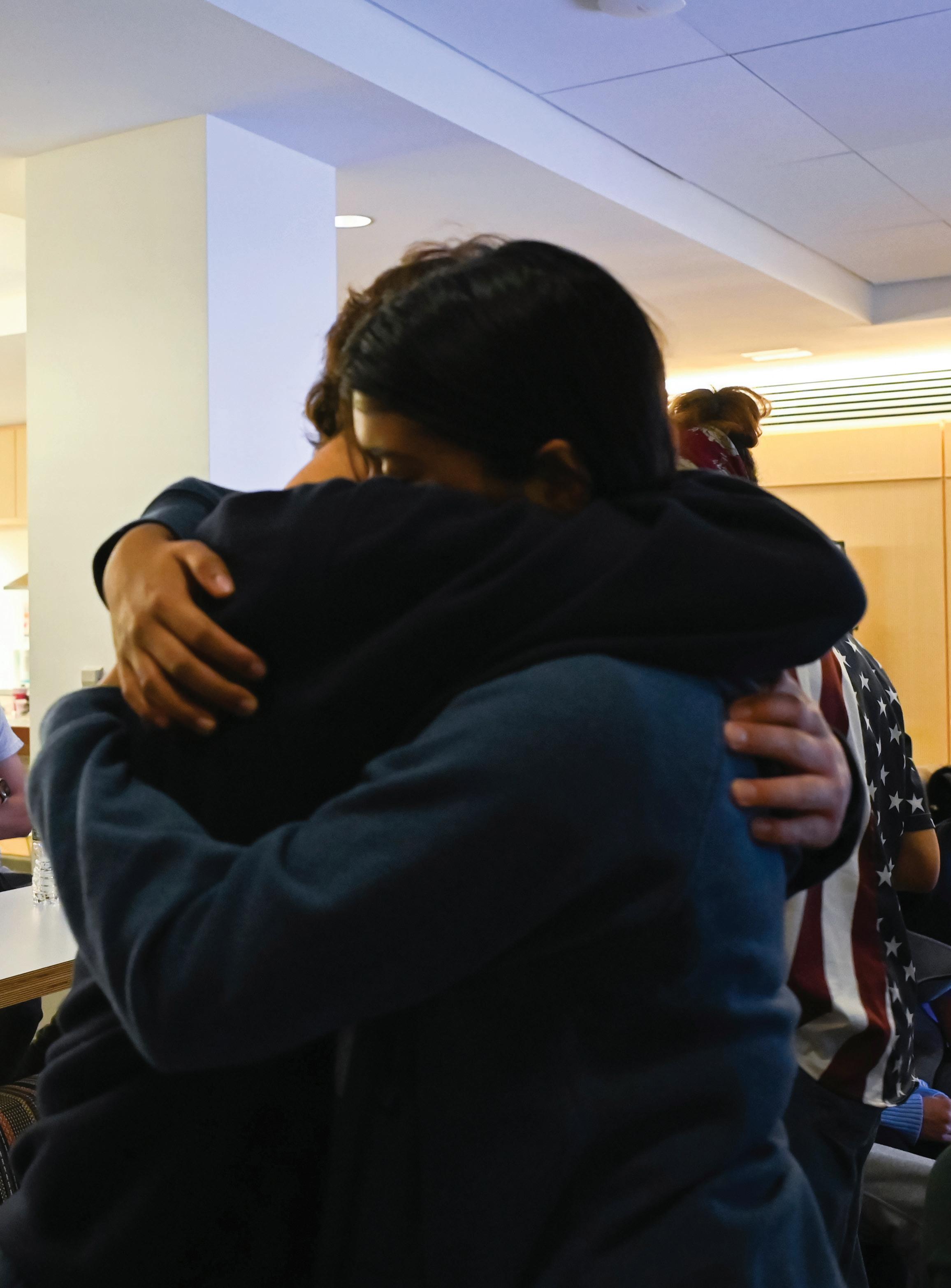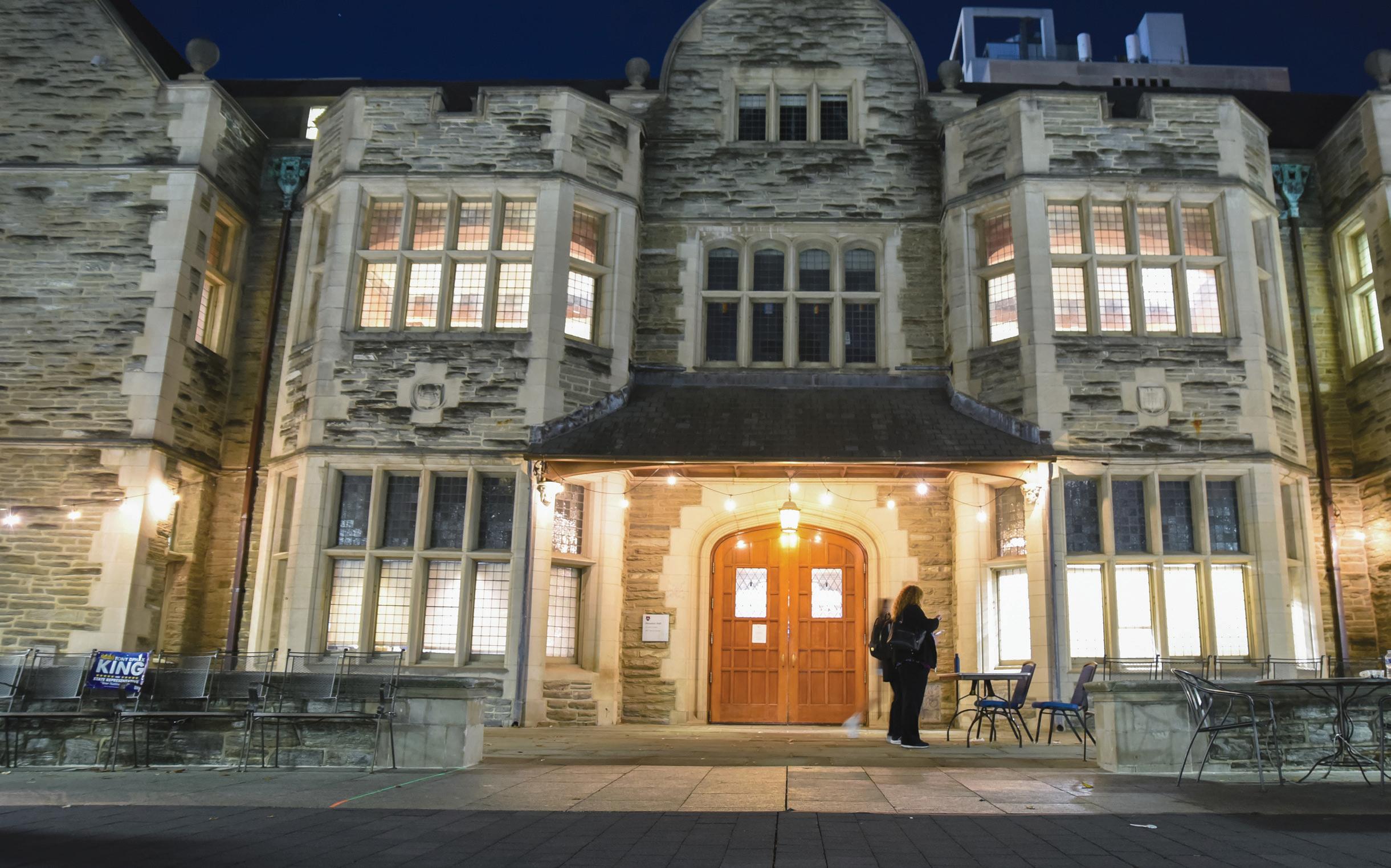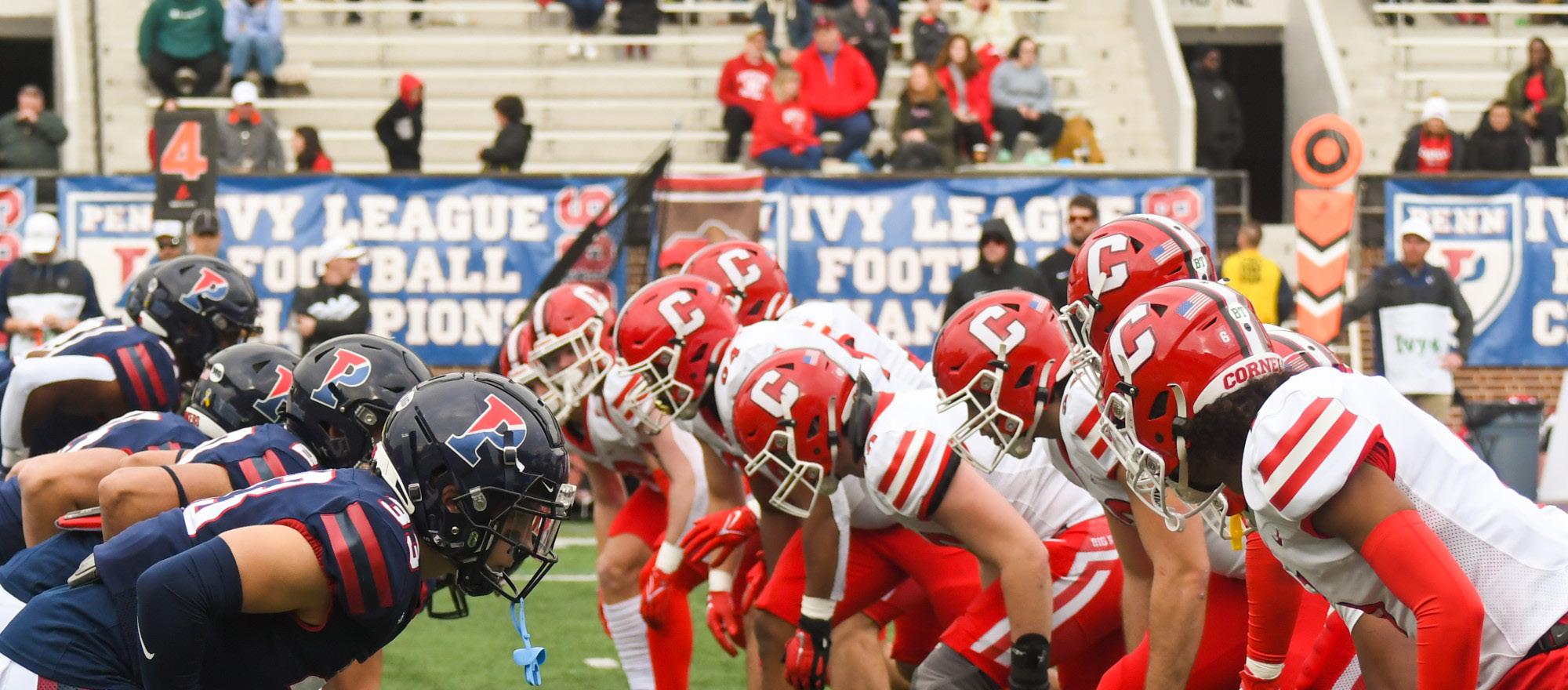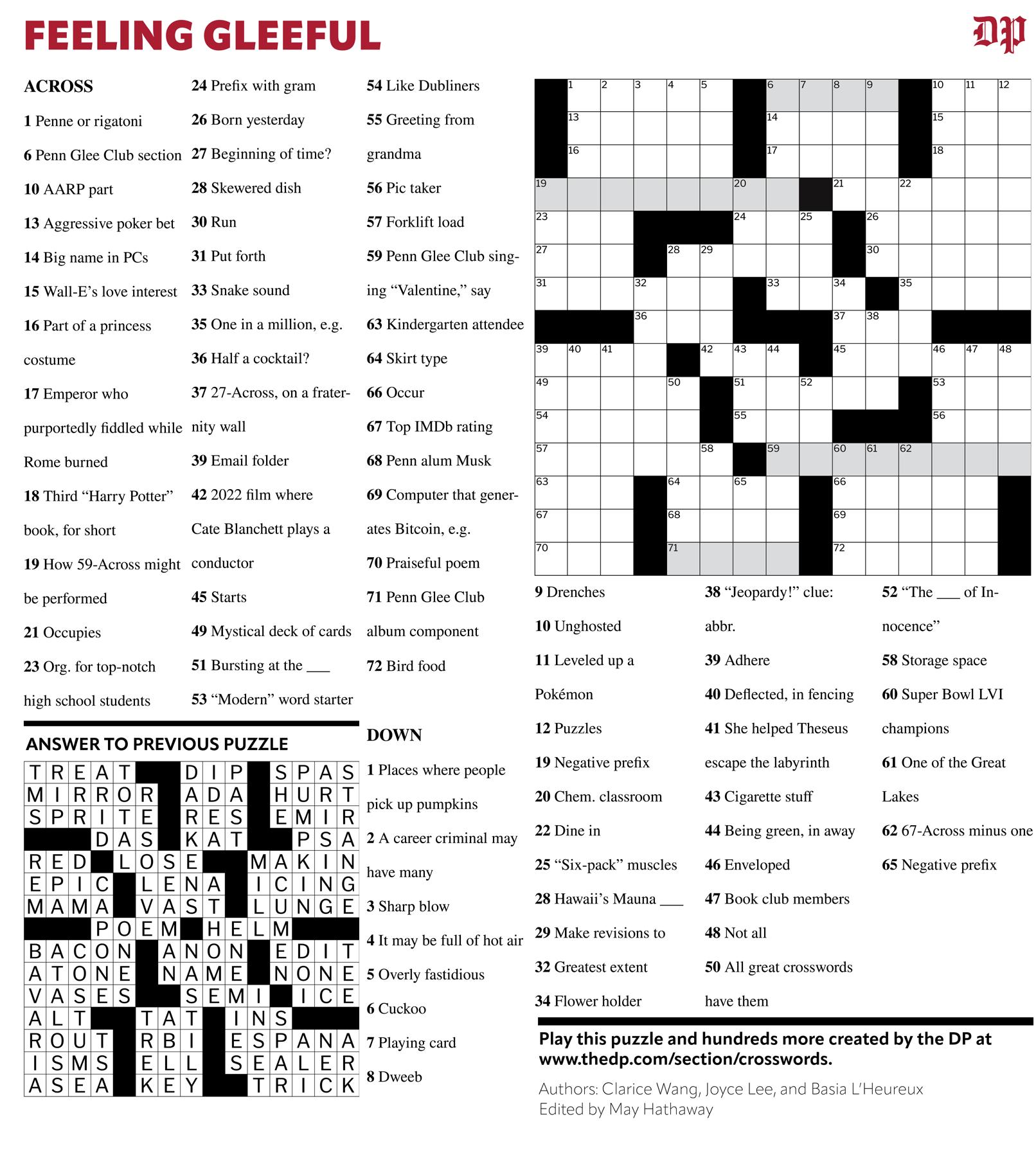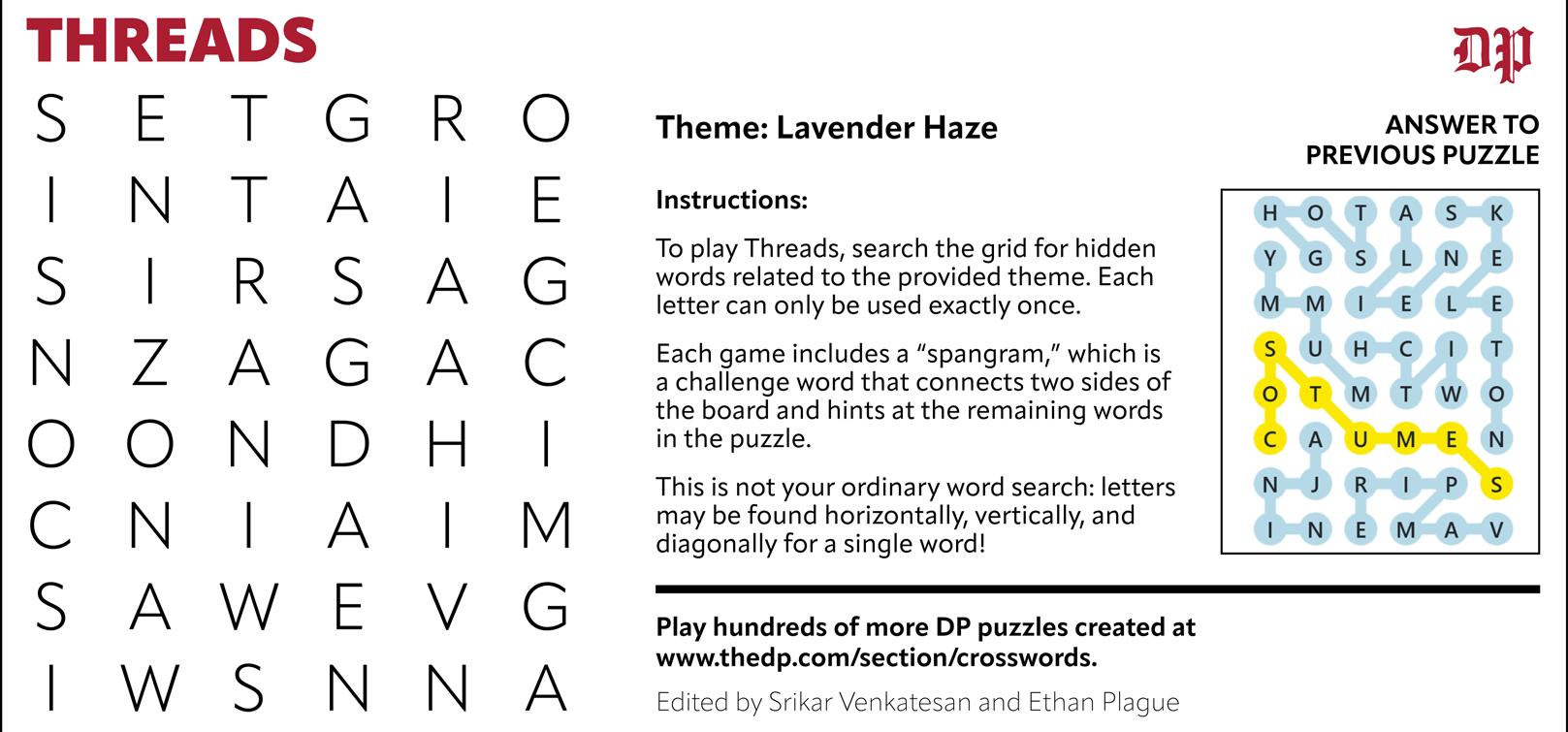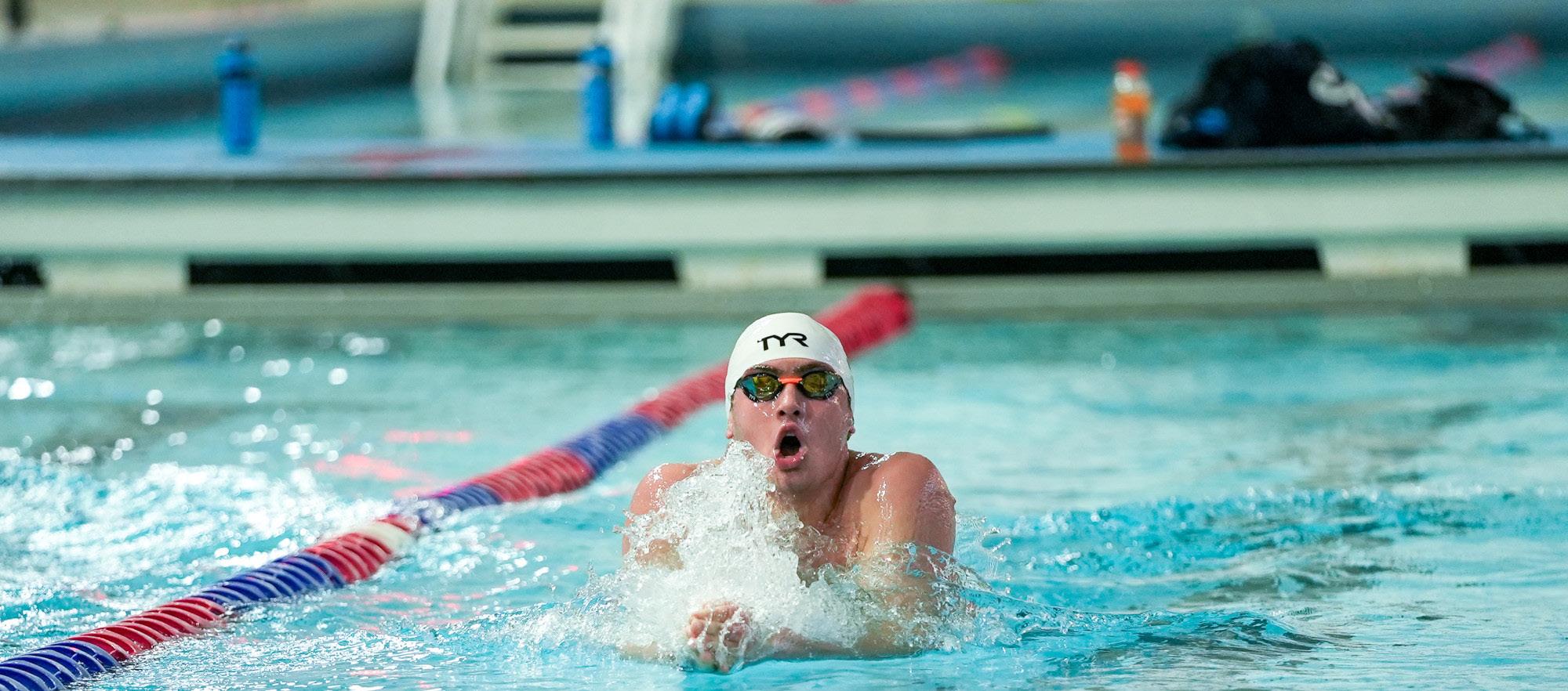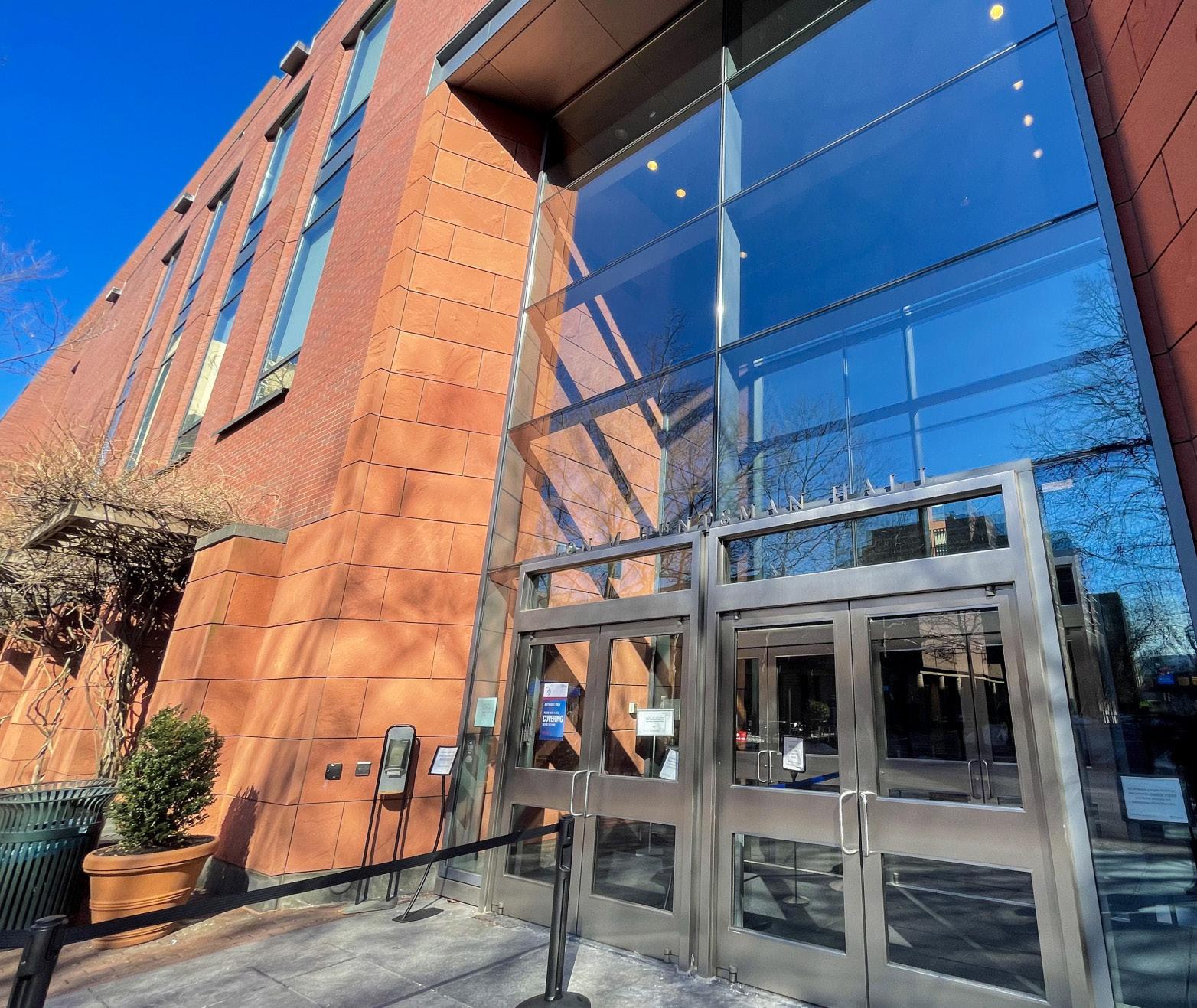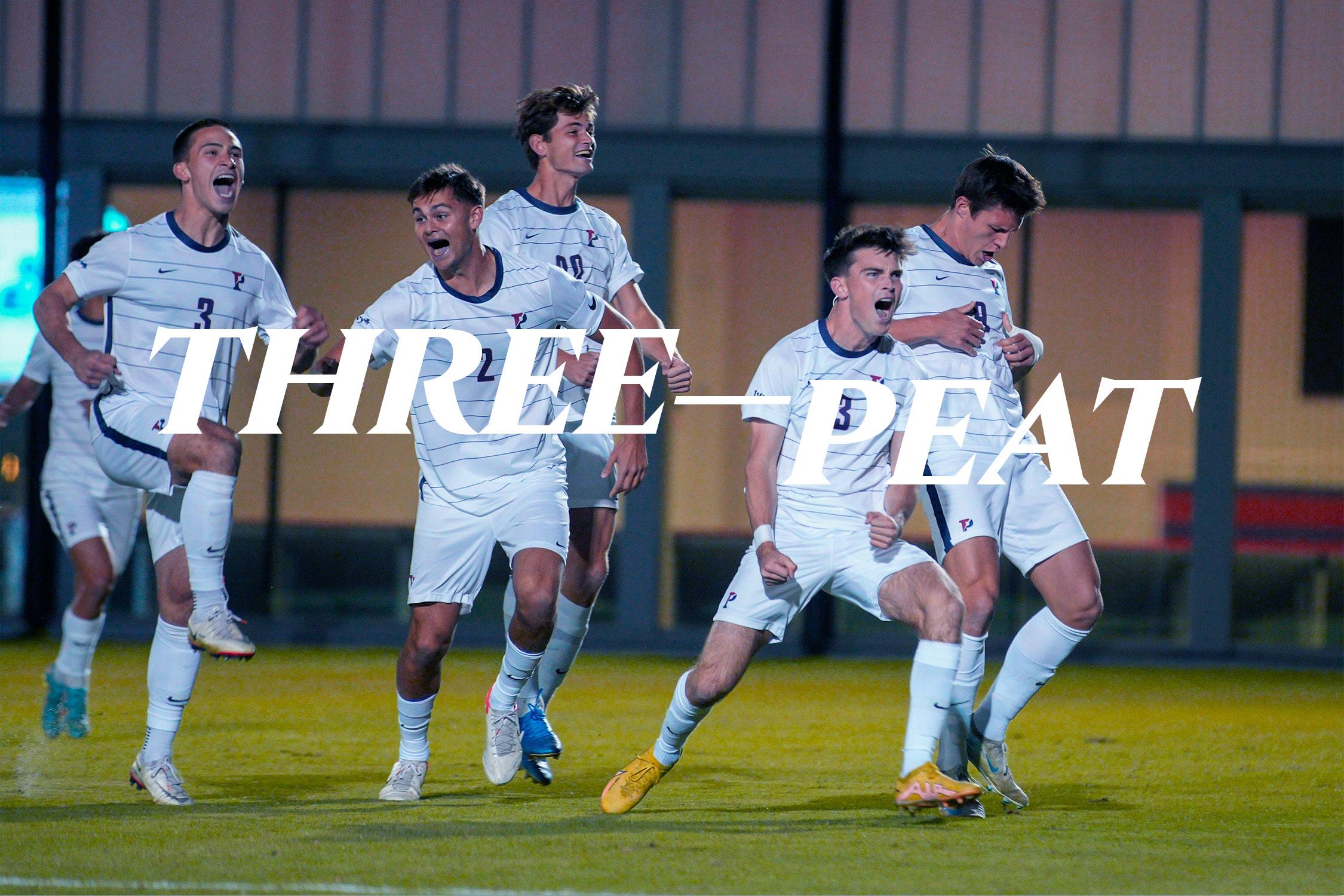TRUMP RETURNS
Donald Trump, Penn alumnus, defeats Kamala Harris to win second term as president
His victory in Pennsylvania and nationwide puts an end to four years of Democratic leadership in
1968 Wharton graduate Donald Trump was elected the 47th president of the United States.
Fox News first called the election for the Penn graduate and former president around 1:50 a.m. on Nov. 6, declaring Trump the victor of the 2024 presidential election, defeating Vice President Kamala Harris in a highly anticipated election to clinch his second term in office. At around 5:30 a.m., NBC News and other outlets called the race after projecting Trump to win Wisconsin, securing the electoral votes to exceed the 270 threshold and win his bid for the White House.
Trump is currently projected to win the national popular vote by 1.5%. Trump was also the projected winner of Pennsylvania, and he declared victory in a speech around 2:30 a.m. at his Mar-a-Lago Club election watch party in Palm Beach, Fla.
Trump said that he had won the national popular vote — though a popular vote winner has not been projected by major outlets — and that Republicans would take control of the House of Representatives and the United States Senate. While all major news networks have projected Republican control of the U.S. Senate, control of the House remains in flux.
This year’s campaign is Trump’s third for president. He first defeated former Secretary of State Hillary Clinton in 2016 and lost to current President and former Benjamin Franklin Presidential
See TRUMP, page 6
Election results shock campus, prompt canceled classes and student dismay
Students expressed grief and disappointment after Trump won the presidential election and carried Pennsylvania — and many professors altered their class and assessment schedules
CHARLOTTE COMSTOCK, THEO GREENFIELD, NICHOLAS
MAHARAJ, ISHA CHITIRALA, AND CHRISTINE OH Staff Reporters and Contributing Reporters
Penn professors and students alike had a wide range of reactions in the wake of 1968 Wharton graduate, former President, and President-elect Donald Trump’s victory in the 2024 presidential election, which was called early Wednesday morning.
Penn professors react, take action
After Trump was named the winner of the election early Wednesday morning, professors acted quickly — canceling classes, offering resources, and adjusting exam schedules.
Economics professor Anne Duchene told The Daily Pennsylvanian that in advance of the election, she had made attendance optional in her ECON 0100 classes, anticipating that election results would take more than one night to declare. After waking up to a “very red map,” Duchene opened her lecture with a short poll asking students how they were feeling.
“I just wanted to acknowledge the wide variety of emotions that were in the classroom and also to respect these emotions,” she said. “It’s really hard to know how the students are, what the students are really thinking, but my interpretation is that they wanted to have a normal class.”
Neuroscience professor Michael Kaplan also preemptively canceled his Wednesday classes for his own wellbeing and due to his strict policy against “politicking from the podium.” He explained that it seemed “ridiculous” to
Harris performed worse than Biden and Clinton on Penn’s campus Trump Opponent
Trump’s proposals could deport students, threaten Penn’s federal funding
consider lecturing without discussing the “elephant in the room.”
Anthropology professor Caroline Jones rescheduled an exam after “a slew of emails” from concerned students about preparing for an exam set to take place right after the election results were announced.
Jones — who teaches “Human Origins, Evolution, and Diversity” — wrote in a Nov. 6 Canvas post obtained by the DP that students were concerned about the impact election results would have on their exam preparation and she wanted to “recognize and validate the disappointment many of you expressed.”
History professor Brent Cebul made class attendance optional and rearranged the class syllabus to facilitate discussion on the election results.
“I just wanted to give students room to share their thoughts and feelings about the election — no matter what side of the aisle they fall on,” he wrote in a statement to the DP.
Some Penn professors elected to adhere to mandatory class policies, despite the election results.
Political Science professor Ian Lustick explained that he did not cancel classes because “students deserve normalcy,” explaining that “classes, in particular, are practically sacred spaces.”
Impact on Penn, Philadelphia, and the nation
Political Science professor Rogers Smith said the incoming TrumpVance administration could impact Penn given the immense political scrutiny it has faced in the last year.
“Elon Musk and associates of Donald Trump will reinforce those conservative political pressures on the University,” Smith said. “The faculty, at least, and probably many students … have reason to be concerned about whether conservative pressures on the University will increase after the election.”
, page 6
The Daily Pennsylvanian analyzed what a second Trump presidency — and a projected Republican majority in the Senate — could mean for Penn and higher education institutions across the country
JASMINE NI AND ETHAN YOUNG Senior Reporter and Staff Reporter
1968 Wharton graduate, former President, and President-elect Donald Trump went into Election Day with a clear roadmap for his second term — including for funding and regulation of higher education institutions like Penn.
The Daily Pennsylvanian examined what a second Trump presidency — and a projected Republican majority in the Senate — could mean for Penn.
At a December 2023 rally in New Hampshire — held a week after former Penn President Liz Magill’s resignation under significant political pressure — Trump referenced several institutions of higher education that had come under congressional scrutiny, including Penn, Harvard University, and the Massachusetts Institute of Technology. He said at the rally he would “take away their tax advantages and grants” if they “attack free speech.”
“We’re going to take away their endowments, and they will pay us billions and billions of dollars for the terror they have unleashed into our once-great country,” Trump said, later telling the crowd that he would “stand up to the radical left communists, Marxists, fascists, and frauds who have taken over our universities.”
The Republican National Committee Platform Committee adopted a resolution in the GOP’s platform in July addressing recent campus protests. One of 20 “promises” contained in the platform advocated for the
the White House
BEN BINDAY AND PAIGE RAWISZER News Editor and Senior Reporter
ETHAN YOUNG | STAFF PHOTOGRAPHER
Kamala Harris
Joe Biden
Hillary Clinton
Penn’s political experts react to Trump’s win, Harris sweep on campus
The professors pointed to voter concerns over the economy and in ation as well as growing dissatisfaction among rural voters as key contributors to Trump’s election to a second term
WANG, AND
PANDIARAJU, DIAMY
VIDYA
JASMINE NI Senior Reporters
Penn professors and polling experts sought to explain how 1968 Wharton graduate, former President, and President-elect Donald Trump won the presidency and Pennsylvania in interviews with The Daily Pennsylvanian — despite losing at Penn and in Philadelphia.
Trump’s win came despite the four main polling locations across Penn’s campus casting 81.6% of votes for Harris and 16.3% of votes for Trump. The four polling places witnessed a dramatic 450% increase in in-person voter turnout compared to the 2020 election.
The proportion of votes for Harris is a slight decrease from the 83% of ballots that were cast for President and former Benjamin Franklin Presidential Practice Professor Joe Biden on Election Day on Penn’s campus in 2020, and a starker decrease from the 91% of votes cast for former Secretary of State and 2016 Democratic nominee Hillary Clinton.
In the highly contentious United States Senate race between incumbent Sen. Bob Casey (D-Pa.) and Republican Dave McCormick, the majority of Penn voters on Election Day went blue — but support for Casey lagged behind that for Harris. 79.8% of voters supported Casey, while McCormick received 17.7% of the votes and thirdparty candidates gained the support of only 2.5% of Penn voters.
A total of 5,132 ballots were cast across the University between 7 a.m. and 8 p.m. in this year’s election.
The DP spoke with four experts affiliated with the University of Pennsylvania Carey Law School, the Penn Department of Political Science and Penn’s Program on Opinion Research and Election Studies. In their interviews, the professors pointed to voter concerns with the economy, inflation, and growing dissatisfaction among rural voters as contributors to Trump’s election — and noted the significant uncertainty surrounding what his second presidency will involve.
Professor of Law and Philosophy Claire Finkelstein wrote to the DP that pro-Trump sentiment “is everywhere” outside of Philadelphia and said that the Democrats failed to cater to “the average rural voter.”
“A growing sentiment during the Obama years, and continuing with Biden, was that the Democratic party has been hijacked by individuals with a far-left agenda, and
[people] are sick of it,” Finkelstein added.
She also explained that many University students are focused on progressive causes and “out of touch” with middle class economic and labor concerns, which is why Trump’s popularity seemed “mysterious” to many college aged voters.
Marc Trussler, the director of data sciences at Penn’s Program on Opinion Research and Election Studies, pointed to economic dissatisfaction and high inflation as key contributors to Trump’s victory.
“What we saw last night was people making a strong statement about how they feel the economy is going and what they see in their checkbooks,” Trussler said.
Political Science professor Matthew Levendusky echoed Trussler’s sentiments, asserting that Trump’s election could be explained by a widespread concern over the state of the economy — particularly inflation. He also said that Biden’s unpopularity played a role in Harris’ defeat, despite Biden himself not being on the ticket.
“[Voters] saw Harris as a stand in for the Biden-Harris administration,” Levendusky said. “She argued that she represented a change, [which] was something hard to pull off when you’re a part of the incumbent administration, and, you know, she lost because of it.”
Trussler also said that issues pertaining to inflation were not unique to the United States, but were prevalent globally in the wake of “necessary” COVID-19 relief measures and could be observed in most other Western countries.
“[COVID-19] relief payments and various methods that were needed to keep employment high led to higher inflation across the Western world, and that may have been necessary at the time, but the governments that put those in place are now kind of paying the political costs of that,” he said.
Political Science professor Daniel Hopkins told the DP that he both did and did not expect the election’s results. He deemed the election as “undeniably unprecedented” given Trump’s involvement in the Jan. 6, 2021 Capitol riot and his status as a convicted felon.
Hopkins also commented on Harris’ unique position as a Democratic presidential nominee after President Joe Biden’s unprecedented concession of the 2024 Democratic nomination.
“We know that Kamala Harris ran in 2020. [She was] very much tacked to the left, and took a number of positions that came back to haunt her in this election cycle,” he said. “I also think that any Democrat would have faced an uphill struggle given both inflation and Biden’s relatively low levels of popularity.”
Finkelstein, reflecting on the significance of Harris’ defeat, the Republican control of the Senate, and what she predicts will be a Republican-controlled house, said that it “sets the stage” for Republican reforms “on a level that the country has not seen in the past 50 years.”
She pointed to abortion bans, immigration restrictions, crackdowns on undocumented residents, and possibilities of military misuse by domestic law enforcement — and potential withdrawal from NATO — as potential policies under the Trump administration.
Trussler said that the country now faces questions and uncertainty about what the next four years will look like.
“What is the response of Trump-ism going to look like? Is that going to be different than the 2016 to 2020 period?” he asked. “What kind of message for the future is the Democratic party going to put forward going from now on?”
The art of de-SABSing
DIYA-LOGUES | The issue of being seen by everyone but yourself
Last week, I committed the ultimate firstyear sin: I ate alone. My friends were in class, I’d had a lazy morning in bed doom scrolling on Instagram, and suddenly, I heard the familiar grumble of my stomach demanding some Kings Court English College House hummus. At first, sitting alone felt strange. Staring out into a cafeteria full of groups, I scanned for the most inconspicuous table hidden within the masses. But as I sat down with my unusual Italian-Lebanese concoction of spaghetti and hummus, something unexpected happened; instead of feeling self-conscious, I felt calm. Weirdly calm.
For once, I wasn’t pretending to be busy on my phone or scanning the room to see who I knew. I was just … there. Surrounded by students — some faces familiar, most not — I
victimhood that has fancied, ironically, the most powerful figures on this campus. But before I go any further, I just want to apologize to the Class of 2024 and especially to 1972 College graduate Jeffrey Rothbard.
For those of you who don’t know, Rothbard, in response to the Gaza Solidarity Encampment last year, said, “as a Democrat, a lawyer, and someone with liberal ideas, I’m a firm believer in First Amendment rights, and I’m uncomfortable about them being abridged by anyone other than a judge. However, in this situation, it was apparent that diplomacy was not going to work.” He’s right: Rights only apply when convenient. Beyond that, I ought to apologize for those participating in the encampment who not only practiced our First Amendment rights but deprived the Class of 2024 of their graduation experience. As I understand, he was “very, very upset by that.” Thousands of kids and mothers killed? I mean, who’s counting? What could be more atrocious than to put Ivy Leaguers through the suffering that is missing their graduation ceremony over 5,700 miles away from a children’s graveyard?
I am well aware of what some of you may be thinking: “This kind of rhetoric is unhelpful to the issue.”
In response to that, I would say that perhaps it does not help the “issue,” but then I would say, “Why should I be civil in my rhetoric?” Why should anyone be “civil” in response to thousands being killed with no justification? We’re not talking about characters in a damn video game or movie; we’re talking about living, breathing (though not so much anymore) human beings.
I would ask you, “how would you feel if your six-year-old daughter Hind Rajab was shot at and killed with 335 bullets by Israeli forces?” How would you feel if you were the father of Shaban al-Dalu and watched your son and wife be burned alive in front of you? How would you feel if your six-year-old child was stabbed 26 times to death simply because he was a Palestinian-American Muslim? Then, I would ask, “Have you lost your mind?”
I am not saying there isn’t pain on both sides. I am not saying antisemitism does not exist. But if I can admit that, I hope you can admit that what is happening in Gaza, the West Bank, and Lebanon is not a “military operation,” but a genocide followed by a series of war crimes and acts of terrorism by the IDF.
If you are for what Israel is doing, knowing what it is doing, you cannot argue you are anything but a genocide apologist. And
if you are of that group and further assert that you do not feel safe on this campus because of the University’s “response” to pro-Palestinian, not genocidal, rhetoric — which established a task force to tackle antisemitism while completely dismissing the hate felt by Palestinian students — then I do not have much to say to you. Frankly, if that is the case, I attribute no humanity, and thus no value, to your view.
You do not need to be a Lebanese Saudi like me or a Palestinian Jordanian like many of my peers to recognize that this is wrong. You just need to be human. This is not your typical issue of critiquing the economic plans of political candidates or engaging in culture wars. We are talking about a people that have been slaughtered time and time again and a region that is on the verge of large-scale war because of Israel’s continual dismissal of international law.
Everything I have brought forward is backed up by international organizations and recognized media companies. The views I have presented are not just my own, but also those of a series of individuals who contributed to this piece who have asked to remain anonymous. These individuals include men, women, Muslims, Jews, Christians, Asians, and Arabs of varying ages. They also include those not affiliated with Penn in any way.
In the end, this is not about ideology or political allegiance; it is about the shared humanity that binds us all. To excuse violence against civilians, to rationalize the systematic suffering of families, and to view the loss of innocent lives as collateral damage is a disservice to justice and human decency. We must reject the notion that war justifies these atrocities and recognize the deep moral failure in dismissing the suffering of Palestinian and Lebanese people. Speaking out against such brutality is not a matter of rhetoric or civility; it is an ethical imperative. In a world where we prize human rights and dignity, silence is complicity and indifference is betrayal. Our collective humanity demands that we challenge these injustices with unwavering conviction and solidarity for all who suffer.
ZAID ALSUBAIEI is a College sophomore studying economics from Al-Khobar, Saudi Arabia. His email address is zaidsub@sas.upenn.edu.
in your day-to-day life. Direct your engagement into a real-world situation. It’s much more authentic that way.
As a matter of fact, that principle extends to what you’re doing right now. Every time I publish a column, I receive far more feedback directed from Sidechat or in an Instagram comment section than I do aimed at me personally.
I’d encourage any of you that have something to say to reach out to me directly. My email is attached to all of my columns. You can approach me in real life, too. There’s no need for a middle man or any hostility when reacting to the sentiment of someone who writes for a college newspaper. Back to my point, though. Each of you
At Penn, this constant busyness feeds into something we all know too well: “Penn Face.”
realized I was just background noise, a supporting actor in their movie. It felt good. I could eat my spaghetti strands unabashedly, mix the hummus with the pasta like a heathen, and even go in for seconds. Ever since arriving at Penn a month ago, I’ve never had a moment truly to myself. Most people would say that’s a good thing. It means you’re always occupied, with never a second to feel low or homesick. But I’d disagree. I don’t think it makes those feelings disappear; they just linger beneath the surface, waiting to ambush you at the most inconvenient moments — like during a neuroscience lecture, when you’re trying to wrap your head around the G protein-coupled receptors (an oddly specific reference that may or may not be autobiographical).
It’s that carefully crafted facade of confidence and composure that signals to the world, “Hey, I don’t know about you, but I’ve got it all together.” But beneath this mask is something deeper: the culture of SABs-ing, or “seeing and being seen.”
Take a stroll down Locust Walk, grab a coffee at Stommons, or hang out by the ARCH, and you’ll inevitably bump into someone you know (aka vaguely recognize from NSO week). They’ll ask how you’re doing and your answer is a preordained, reflexive “Great!”
You might even toss in a humble brag about acing the midterm quiz, but you’ll leave out the part about subsisting on solely a ramen diet since Tuesday.
My point is this: Sure, you might be physically “seen,” but are you really being “seen”?
If this comprises almost all of our interactions, who is truly seeing us? More importantly, are we seeing ourselves? We’re so busy curating the perfect version of ourselves — polished, successful, smiling — that we risk losing track
reading this column can probably think of someone that you know of whom you don’t necessarily know personally. Right now, you don’t gain anything from that relationship. But I’d bet that it could form into an amazing friendship if you put in the effort. Penn can be intimidating in general, but it doesn’t have to be. We can easily change the way we view this campus through our own actions.
JACK LAKIS is a College sophomore studying political science and communication from Kennesaw, Ga. His email is jlakis@sas.upenn.edu.
of who we really are underneath all of that.
That lunch made me realize that as much as I love a good SABS moment, it might also be time to start incorporating some de-SABS-ing in my lingo and to find spaces and moments where I’m not being seen — or seeing anyone else — just reconnecting with myself. Next time you find yourself with a few minutes to spare, try it. Take a walk through campus listening to your favorite fall playlist, or just sit on a bench (preferably not the Ben Franklin one). Those five minutes might be all it takes to quiet the noise and make you appreciate this incredible place you’ve worked so hard to be in.
While de-SABs-ing, maybe even have lunch with your first-ever friend — yourself. One thing’s for sure: They’re always available.
DIYA CHOKSEY is a College first year studying cognitive science from Mumbai, India. Her email is dchoksey@sas.upenn.edu.
DESIGN BY INSIA HAQUE
Columnist Jack Lakis explores how campus social culture is impacted by chronically online relationships.
Editorial | Trump does not represent Penn
THE DAILY PENNSYLVANIAN EDITORIAL BOARD | Trump’s
Leges sine moribus vanae: Laws without morals are useless.
This Latin phrase — Penn’s motto — was no doubt imparted on 1968 Wharton graduate, former President, and President-elect Donald Trump during his two years at our University.
And yet, as Trump takes the reins for a second term as president, it’s clear that the United States faces an imminent future governed by laws devoid of the moral compass that once guided us. The election results mark the beginning of policies that will place a significant burden on communities like ours here at Penn and in Philadelphia.
America has made a choice — an unequivocal one at that — but it is not a choice for which The Daily Pennsylvanian Editorial Board stands.
The immediate implications of the choice to make the 45th president our 47th president cannot be understated. His return to the White House will free him from the shackles of ongoing prosecution for countless criminal charges. His presidency will be emboldened by two prior impeachment acquittals, unburdened by a conviction on 34 felony counts, and unpunished for his incitement of the Jan. 6, 2021 insurrection at the U.S. Capitol Building.
But Trump’s victory is not only a personal one. He will sweep into power with a resounding Republican majority in the U.S. Senate and likely control of the House of Representatives. This rightward shift, supported by millions of
Americans, leaves Penn’s campus and Philadelphia a stalwart blue island in a sea of red. But even our island is eroding: This year, Trump notched the strongest performance on campus of his three presidential campaigns.
The Penn community is not immune to the consequences of Trump’s reign. In fact, its effects will be felt more quickly and acutely than during the first Trump administration. The president-elect’s allies have spent years preparing for a popular mandate like this one, crafting a roadmap for the next Republican president that will make opportunities less attainable for female, LGBTQ, low-income, minority, and international students, and many more communities.
Female students will encounter more obstacles coming forward if they are the victims of sexual misconduct — as Trump will likely undo the changes to Title IX made by President Joe Biden, reducing the types of misconduct universities must investigate and requiring such misconduct to be “objectively offensive” in order to be considered. They will face additional threats to their bodily autonomy, as the architect of the reversal of Roe. v. Wade returns to office with the potential for two more Supreme Court appointments that will secure the ideological tilt of the bench for generations. At a recent rally, Trump said, “Whether the women like it or not, I’m going to protect them.” His record speaks otherwise.
LGBTQ students are likely targets of threats
Who is to blame for the election’s outcome? The Democratic Party
GUEST COLUMN | Donald Trump did not win the election; the Democrats lost it
Major news networks, social media, and student publications like this one are going to look for someone to blame for letting a convicted felon and known fascist liable for sexual abuse back into the White House.
They will blame those pesky pro-Palestinian protesters who just couldn’t look past the ongoing genocide in the Middle East. They will blame Green Party candidate Jill Stein and others who threw their hat into the ring. They will blame Generation-Z men, who have become increasingly estranged from the Democratic Party in recent years. They will blame Chappell Roan, for some reason. They will blame everyone but themselves. The Democratic Party has failed us, and we will suffer through another Trump presidency because of it.
President Joe Biden is partially to blame, of course, for sticking around in the race until late July. Biden’s cognitive decline has been on full display for the entire country since the 2020 election. Biden was what we needed back then, but to keep him in this race so long was not just irresponsible — it was asinine. It’s quite fitting that the final nail in the coffin for the celebrity-obsessed Democratic Party’s fight to keep Biden on the ballot was seemingly an op-ed by George Clooney, but it got the job done.
Once Biden finally bowed out of the race and was labeled a “great statesman” by his constituents, the Democratic Party failed to hold a true primary election and opted to rush Vice President Kamala Harris into the candidacy.
Now, it is easy to point at other possible candidates and say that they would have outperformed Harris, who is currently losing the popular vote.
I am not interested in this speculation at all. You can go to X, the platform formerly known as Twitter, to read fanfiction about Pennsylvania Gov. Josh Shapiro or Michigan Gov. Gretchen Whitmer becoming president.
However, there is a lot to be said about taking the choice out of the hands of Americans. A rushed primary would have been possible, and it would put into place the candidate who had the best chance of winning. This candidate may and well have ended up being Harris, but we will never know for sure. The lack of a true primary also strengthened the idea that the Democratic Party was run by a few elites, a claim that Republicans ran with.
America will be devoid of the moral compass that once guided us
to Title IX. Trump has proposed potential alterations to the definition of sex and policies that are expected to create a hostile environment for transgender people.
Trump’s policies could also pose additional difficulties for low-income students if he makes good on his stated opposition to student loan forgiveness and Pell Grants. His last administration undermined students’ ability to afford college when the U.S. Congress passed a round of tax cuts in 2018 eliminating directsubsidized loans and weakening the Pell Grant program. The plans devised by Trump’s allies to eliminate the U.S. Department of Education will threaten federal funding of high-poverty schools and districts.
Immigrants and people of color will once again be subjected to dangerous rhetoric by Trump and those around him. Last week, a comedian at a Trump rally called Puerto Rico an “island of garbage.” Trump’s stance, already fuel for bomb threats on schools, will inflame a campus environment already pierced by racist, homophobic, and antisemitic attacks on students. Trump’s plan for the education system includes a decrease in resources that promote diversity, equity, and inclusion and race-related curricula.
International students will be subject to intense policing of political speech. Earlier this year, Trump vowed to “immediately deport” students who participated in pro-Palestinian protests on college campuses — rhetoric which
Once Harris was in place for the candidacy, though, her campaign strategy would see her frolicking with war criminals and promising to elect a Republican to her cabinet.
As millions of Americans looked to Harris to appeal to the left, she instead ran a diet-Republican campaign. She offered a tough-on-immigration stance and promised to strengthen the southern border. She befriended known torture aficionado and former Vice President Dick Cheney, parading around his daughter and former United States Rep Liz Cheney (R-Wis.). She also offered no real insight into stopping the genocide in Palestine, which has a death toll exceeding 43,000.
Harris also flipped on many of her past campaign policies to appeal to the moderate voter. What happened to her 2020 campaign promise of “Medicare for All”? How about gun control? Oh, and then she appears on 60 Minutes, boasting about owning a Glock? What about her promise on restricting fracking, what happened to that?
Through attempting to appeal to the moderate voter, Harris watered down any promise she once ran on. Simultaneously, she pointed to Republican platforms as the favorable ones, leading voters directly into the lap of 1968 Wharton graduate, former President, and President-elect Donald Trump.
I fear the Democratic Party will learn the wrong lesson from this outcome and commit further to the ideals of the American right. The issue was not that Harris appeared too extreme; it was the opposite. She was a candidate running on centrism.
The party needs to recommit to the core values of its base, or it risks losing them for good. I saw these values firsthand as students on our campus flocked in large numbers to the polls to vote for Harris. These students care about healthcare rights, gun control, protecting the rights of queer people, lowering the cost of living, and ending war abroad, not a Dick Cheney endorsement.
Following this historic loss, a misguided overhaul of the Democratic Party will kill it for good.
CONOR SMITH is a junior and former summer Deputy Sports Editor at The Daily Pennsylvanian studying communications from Mount Royal, N.J. His email address is conorfs@sas. upenn.edu.
follows his history of anti-immigrant policies and promises to execute the “largest deportation program in American history.”
As Trump prepares to take aim at policies that protect and empower countless students at Penn, it is no wonder that a sense of devastation and dismay is permeating through campus. These feelings are real and valid, but the election is not the end.
Rather, this a wakeup call for Penn to confront the United States we didn’t choose. This is a chance to acknowledge the realities of a divided nation, but also its underlying anger. Trumpism is a product that sells in an angry, divided country — but it is imperative for us to maintain momentum and hope. Penn mobilized a significant portion of its student body the months leading up to the election, well surpassing election turnout in 2020. It is only by continuing to show up and organize that we can fight for a future in which all Americans, regardless of their personal identities, have the respect and rights they deserve.
Trump does not represent Penn. It is up to us to show that we stand for something different. Editorials represent the majority view of members of The Daily Pennsylvanian, Inc. Editorial Board, which meets regularly to discuss issues relevant to Penn’s campus. Participants in these meetings are not involved in the reporting of articles on related topics. Reach us at edboardchair@dailypennsylvanian.com.
Speak up, own your vote
PIPER’S PEN PAL | We can only progress by openly expressing our political beliefs
I remember waking up as a 10 year old on Nov. 9, 2016, crying in my mother’s arms about the colossal mistake just made by the American people. Nearly eight years later, I woke up to the news of another four years of 1968 Wharton graduate and former President Donald Trump’s regime feeling like the same little girl, only this time in a college dorm instead of rock star bed sheets.
Growing up in rural West Virginia as a Democrat was a battle often fought and rarely won. West Virginia is a deep red state, with the Republican Party winning by an increasing margin each election. In the 2024 presidential election, Trump received 70% of the votes in the state. Not one county turned blue. Outside of my parents and a few friends, I grew up surrounded by a deeply conservative ideology which, among other things, taught me that my political views were to be hidden and only revealed in private.
Coming to Penn was my first chance to be in an environment that celebrated the ideals I’d been suppressing. Students and faculty at Ivy League schools are typically left leaning. Penn itself is known for its majority leftleaning student body with conservative students in the minority. While I am surrounded by significantly more left-leaning students at Penn than I was at home, that doesn’t mean political opinions are necessarily shared freely on campus.
In a video posted on Leading Britain’s Conversation, a British phone-in and talk radio station’s TikTok page, a reporter can be seen interviewing young men on Penn’s campus on their pick for the 2024 presidential election. The men for Vice President Kamala Harris openly expressed their support and intention to cast their vote for her.
But with more searching, he encountered students who were unsure about sharing their political party or ideology — which, the reporter noted, was a characteristic of students likely casting their vote for Trump. Conservative students at Penn have expressed fear of
openly declaring their political opinions in fear of rejection or ostracizing by students, faculty, and the University — raising questions as to the status of free speech on our campus. In class, I have been a part of numerous discussions about the unspoken limitations of speech within classrooms and on campus.
In a 2024 survey by the Foundation for Individual Rights and Expression, Penn was ranked fourth worst for free speech on college campuses. Penn’s place was determined “by surveying students on several components related to free speech, including ‘comfort expressing ideas,’ ‘disruptive conduct,’ and ‘administrative support.’ It also accounted for university responses to ‘speech controversies’ such as scheduled events, invited speakers, and the sanctioning of student groups.” Given Penn’s struggle with free speech, the election demonstrated the same cracks in our foundation.
Just as I was in West Virginia, Trump supporting students at Penn were minimized to their own self-fulfilling ecosystem where they relied entirely on their own beliefs instead of any outside sources in fear of retaliation. Without any input from dissenting opinions, this can reinforce an echo chamber of radicalization. All Penn students deserve to openly express their political ideologies. This does not mean, though, that they are exempt from the consequences of those beliefs.
In fact, I urge each student to embrace those consequences that come with expressing their political opinions. Fostering an environment where students can practice critical thinking and intellectual discussion is vital to break down the political polarization existent in America. Building a successful generation of American citizens means supplying our students with the skills to build a nuanced understanding of our political system. Perhaps the only way to gain this understanding is in conversation with the opposing side.
As voters in arguably the most important state in the 2024 presidential election, students at Penn should express the choices they made loudly and take accountability for them. For students on both sides of the political spectrum, be open to academic debate — if not to alter your views, to enrich your understanding and values. The only way we can move forward as a nation is to first declare our opinions openly. With a culture of accountability and participation in difficult conversations, we can move towards progress and potentially better results for the future of our country.
PIPER SLINKA-PETKA is a College first year studying health and societies from West Virginia. Her email address is pipersp@sas.upenn. edu.
JEAN PARK | SENIOR PHOTOGRAPHER AND DESIGN BY SYDNEY CURRAN
Practice Professor Joe Biden in the 2020 contest.
Trump’s victory puts an end to four years of Democratic Party leadership in the White House. President Biden’s approval ratings have been underwater for much of his term, with concerns about the president’s age contributing to Biden’s concession of the Democratic Party nomination to Harris on July 21.
Trump will become the first felon to serve as president, and the second president in American history to serve nonconsecutive terms after Grover Cleveland in the late 19th century.
Sen. JD Vance (R-Ohio), Trump’s running mate, was also elected as vice president of the United States.
After refusing to concede Biden’s victory in 2020 and inciting the Jan. 6, 2021 riot at the Capitol, Trump again made unfounded claims of fraud during this year’s election. On Tuesday, Trump alleged on Truth Social that there was “a lot of talk about massive cheating in Philadelphia” and that “law enforcement [was] coming” — a claim which was widely denounced by officials, including Philadelphia District Attorney Larry Krasner and the Philadelphia Police Department.
On the campaign trail, Trump heavily focused on immigration, the economy, and election integrity. He and his campaign team have stated that his administration will execute mass deportation plans and increase tariffs on imported goods, specifically from China. In the final days of his campaign, his rally at Madison Square Garden made headlines for discriminatory comments made by speakers at the rally against Puerto Rico and Latinos — which garnered criticism from Penn’s Latinx Coalition.
Trump also overcame a campaign dominated by controversy, including a criminal conviction on 34 felony counts for falsifying business records — marking the first time a former president has been found guilty of a crime. Trump has also found himself subject to dozens of additional criminal charges, two assassination attempts, and two presidential impeachments.
Trump’s victory in Pennsylvania — and clinch of the election — came after both campaigns made a concerted effort to court voters in the Commonwealth. The Commonwealth of Pennsylvania was described by The Brookings Institution as “the presidential election’s most important state.” The state previously led Trump to his 2016 victory and Biden to his 2020 victory.
REACTIONS, from FRONT PAGE
Communication professor Jessa Lingel said her main concern was “people feeling safe and being safe.”
Penn overwhelmingly cast its ballots for Harris. At the four primary voting locations for Penn students, Harris won 81.6% of the in-person votes from the Penn community relative to Trump’s 16.3%. While turnout at these locations dwarfed that of 2020, the proportion of these voters who cast their ballots for Harris was a decrease from Biden’s 83% in 2020 and Clinton’s 91% in 2016.
Harris handily carried Philadelphia County, where Penn is located, with 79% of the vote in the more than 95% of precincts reporting. Philadelphia’s suburban counties were strongly contested and touted to play a decisive role in the election, with both the Harris and Trump campaigns making frequent stops in the region leading up to the election.
Both campaigns have rallied exclusively in swing states in the weeks leading up to the election.
At one of Harris’ final rallies before the election, Philadelphia Mayor and 2016 Fels Institute of Government graduate Cherelle Parker said that “the road to the White House goes right through the Keystone State.” 1997 College and Wharton graduate Elon Musk has also made headlines in the state surrounding his pro-Trump super PAC’s financial donations to Pennsylvania voters.
Trump last campaigned in Philadelphia in June, when he hosted a rally at Temple University’s Liacouras Center. Much of his campaign’s activity in Pennsylvania is concentrated in the western side of the state and rural areas, where his base lies. He spent part of his last campaign day before polls opened on Tuesday in Reading, Pa. and Pittsburgh.
Penn has also risen to national prominence during this year’s campaign season. The University has been cited in the context of Trump and Biden, particularly the analyses by the Penn Wharton Budget Model discussing Trump’s and Harris’ potential effects on the federal deficit and economic growth and controversies throughout the past year related to alleged antisemitism on campus and congressional scrutiny.
While Trump is Penn’s first presidential alumnus, the University has historically been reluctant to make the connection. Trump has also slowly distanced himself from Penn in his 2024 campaign, though he and his family have historically had strong ties to Penn beyond just his alumnus status — several of his children also attended Penn, and he has possibly donated more than $1 million to the University.
The Penn community and the greater Philadelphia community have been heavily involved in the 2024 election, with numerous celebrity appearances on campus to encourage turnout and greater political action and participation on campus.
the system he represents is unjust?” Flausino also expressed concerns about the ramifications of a second Trump administration on foreign policy, citing Trump’s “isolationist perspective” as a “direct threat to the safety of the land of my ancestors [in Latvia].”
to properly grasp the extent of his influence, not only in the U.S., but in the world.”
“I want to make sure there are spaces on campus and in Philadelphia where queer people, feminist people, trans people, can come together and find the support that they need after Trump’s reelection,” she said. Penn students have also struggled to come to the terms of Tuesday’s election. College sophomore Anna Maria Flausino described her “incredible disappointment” with the results, adding that, as a first-generation American, she has newfound concerns about attending Trump’s alma mater.
“I realized that the only way I could satisfy my anger about the system was to become an agent of change within it,” she said. “Having the privilege of pursuing my passions at one of the most prestigious universities in the country has made the election of Trump twice as disturbing. How can a school that educated the man who threatens my rights also educate me of the ways
College first year Rachel Erhag, an international student from Sweden, echoed those concerns.
“We followed the 2016 election at my old school in Sweden and when Trump won, I was in shock,” she told the DP. “It didn’t feel real to me because I was so removed from the United States. But now that I’m here for university, it is so much more tangible. Now I’m able
College first year Amy Tran — who told the DP that she “grew up very Catholic” and remains involved with the community at Penn despite not identifying as “fully Catholic in the traditional sense” — said that her support for reproductive rights is not based “off of just one subset of beliefs.”
“I’m not just thinking about myself, but thinking about a generation,” she said. “I am afraid for what could happen, not only if those ideals are spread and they’re seen as acceptable and as the face of our leadership, but also what would happen if I were to have
UMA MUKHOPADHYAY | STAFF PHOTOGRAPHER
Students embrace each other as Pennsylvania is called for 1968 Wharton graduate and Presidentelect Donald Trump.
children, or if they were to have children, and something were to happen [to them].”
Penn Democrats wrote in a statement to the DP that it is “deeply saddened by the news and terribly frightened by a second Trump presidency.”
“We would like to thank all the members of our community who tirelessly fought for freedom and democracy,” the group wrote. “We respect the result, and we will fight on.”
Many students were surprised by the rapid sequence of state-level Trump victories, especially in highly contested swing states. A lifetime resident of Philadelphia, Flausino said she “expected more” from Pennsylvania and that “Democratic mobilization fell short” despite record-high voter turnout at Penn on Election Day.
Others, like Erhag, were not surprised by Trump’s victory.
“I’ve always thought that the U.S. is a little bit unhinged,” she said. “Although I had my hopes that Harris would enter office, I always knew that Trump had a bigger chance.”
Not all Penn students were dismayed by the results. Wharton sophomore and Penn College Republicans member Finn Broder wrote to the DP that the election results were a point of clarity and a reason for pride.
“While Americans from all walks of life have sharply conflicting viewpoints on President-elect Trump, last night could not have been a stronger rebuke of today’s Democratic Party agenda,” Broder said. “As someone who has been deeply concerned with polarization in America, I am very pleased that Mr. Trump’s moderate and common-sense platform — when compared to his opponent — prevailed across the country.” Broder also stressed the importance of bipartisanship and hoped that “the Democratic minorities in Congress will serve to further unify the nation by contributing to policies which we can all be proud of.” College senior and College Republicans Vice President Chloe Hunt reflected on the difficulty of navigating polarized reactions to the results and emphasized the importance of tolerance and community at Penn in its aftermath.
“I think it’s impossible to celebrate a victory when I see so many friends and family who are grieving and super worried about the future, and rightfully so,” she said. “I hope that us Republican-leaning independents can navigate this time with a lot of compassion and empathy for the real struggles that many Americans are facing, beginning with kindness and mutual understanding on campus.”
The day after Trump won his first presidential election in 2016, professors canceled classes and exams for students distracted by a long election night, and representatives from student organizations expressed fear and uncertainty to then-Penn President Amy Gutmann at a University Council meeting. Hundreds of Penn students and staff also gathered for a solidarity walk in response to Trump’s victory.
In the weeks following Trump’s 2016 victory, Penn community members faced hateful and racist actions, and a group of protesters marched to Franklin Field during a football game in response.
Despite Harris’ defeat, Flausino reflected on what a Harris administration could have looked like.
“I saw myself in Kamala,” Flausino said. “The American dream that motivated my parents to come to America is no longer the same.”
IMPLICATIONS, from FRONT PAGE
deportation of “pro-Hamas radicals” to “make our college campuses safe and patriotic again.”
Project 2025 — the Heritage Foundation’s 900-page manifesto for a future conservative presidency — contains a robust section on higher education reform. The document includes proposals to restrict federal funding to higher education institutions, pause loan forgiveness programs, and restructure university-level pedagogy.
It remains unclear what action Trump or a Republican-controlled Congress would take to restrict federal funding from universities like Penn, or through what channels. While Trump has attempted to publicly distance himself from Project 2025, his campaign and allies have many connections to the Heritage Foundation and the initiative, with nearly half of the document’s authors and editors having served in Trump’s first administration.
Project 2025 accuses President and former Benjamin Franklin Presidential Practice Professor Joe Biden and former President Barack Obama’s administrations of transforming the Department of Education into a “politically motivated” agency
whose processes “have done nothing to dampen the illiberal chill that has swept across American campuses over the past decade.” The plan, in response, proposes eliminating the DOE altogether.
The plan also advocates for states to hold more control over accreditation processes to prevent agencies from mandating diversity, equity, and inclusion policies that may conflict with institutional missions, especially for faith-based schools, and to prevent federal agencies from “intruding on the governance” of such institutions.
It further calls on the next president to issue a series of executive orders curtailing DEI and critical race theory programming — potentially impacting academic research on such subjects and cultural resource centers at Penn.
The plan places a focus on curbing foreign influence in higher education, particularly from China. According to the proposal, “more than 100 universities” received donations derived “from the Chinese Communist Party and its proxies.” It suggests curbing foreign contributions exceeding $250,000 and tying federal funding to foreign contribution reporting requirements.
A Trump presidency, Republican control over the Senate, and potentially control of the House of Representatives would increase the likelihood of intensified congressional investigations into
universities like Penn over allegations of antisemitism.
In May, House Speaker Mike Johnson (R-La.) announced a House-wide investigation into antisemitism on college campuses, involving six House committees. The investigation expanded ongoing probes into universities’ responses to campus antisemitism, including two committees’ previous investigations into Penn.
On Oct. 31, the House Committee on Education and the Workforce — one of the committees which originally investigated Penn — released a report characterizing the findings of its investigations, including Penn’s disciplinary data and internal correspondence between administrators. Trump could also try to mobilize federal resources to fight what he calls “out of control” crime in cities like Philadelphia across the country — a frequent talking point of the former president at rallies throughout his campaign. Project 2025 calls for the importance of addressing crime and the need for strengthened efforts to combat it effectively.
“The department’s leadership must make actually reducing violent crime a priority across the United States — and it must do so in partnership with state and local officials in a manner that is tailored to the needs and conditions in those states and localities,” the plan reads.
CHENYAO LIU | SENIOR PHOTOGRAPHER
Penn community members take photos of the posted receipts for the Houston Hall voting divisions.
‘This is a personal game’: Football to meet ‘familiar faces’ in Cornell clash
Three members of the Cornell coaching staff departed from Penn over the offseason
Bears don’t scare Penn football.
After holding off a red-hot Brown offense last weekend for its first Ivy League win of the season, the Quakers are more than ready to take on the Big Red Bear of Cornell.
“We know some familiar faces up there, so this is a personal game,” junior wide receiver Jared Richardson said, referencing a group of coaches that left Penn for Cornell in the off season. “We have to stay focused and evenkeeled throughout the game. Can’t be up too high, can’t be down too low. Just have to play consistently.”
This Saturday, the Red and Blue will travel up to Ithaca for the 130th matchup between the two sides — a combination that is the fifth-most played series in the Football Championship Subdivision. The game will also be the 29th edition of the Trustees’ Cup. In short, Penn vs. Cornell
AUSTEN, from FRONT PAGE
Austen has impressed in her first year as the bonafide starter, featuring as a key piece in each positive result that the Quakers were able to secure this year. In a 1-0 loss against a Princeton side that finished first in the Ivy League, Austen recorded a career-high 10 saves. That same week, Austen posted three major saves in the dying minutes of the team’s game against Brown, which finished third in the conference, to preserve the tie.
Seven saves in the Red and Blue’s next match at Dartmouth also played a key part in the Quakers leaving Hanover, N.H. with a tie and not a loss. And to cap off what would have been a winless season for Penn, Austen put up another seven-save performance in the team’s last game of the season to hold the Big Red scoreless en route to the team’s first win in Ivy League play. For these performances, Austen earned Ivy League Defensive Player of the Week honors three separate times.
“She makes amazing saves in training every single day,” coach Krissy Turner said about Austen after the
is a rivalry steeped in tradition, which has been a point of emphasis for coach Ray Priore heading into this week’s practices.
“I shared a little bit of that history with the players,” Priore said. “I think it’s important to understand the traditions and the history of the program and the league itself. And when you’re playing those types of games, our kids always like to understand.”
Last year’s clash was headlined by then-freshman running back Malachi Hosley breaking loose for two scores of 68 and 96 yards — the second of which set the record for longest offensive play in program history. Hosley finished that game with 261 yards. After already racking up four games where he has tallied more than 100 yards on the ground this season, Hosley will seek to continue his dominance over the Big Red.
team’s game against Northern Arizona University earlier this year. “So I think she’s just going to keep learning and growing, and the group in front of her is going to keep becoming more and more confident.”
And her teammates have found solace knowing that Austen has their backs.
“It’s a very hard feeling to describe,” Robke said.
“She gives us a sense of calm and a sense of peace amidst all the chaos that’s going on, because as a back line, usually it feels like there’s a lot of pressure, and you can never make a mistake. But knowing how good she is at what she does definitely takes the pressure off at least a little bit.”
Despite the season ending with the Red and Blue missing out on yet another Ivy League tournament, Austen’s hopes for the team moving forward are high.
Austen’s journey to her current status has been a long one that has involved plenty of sacrifices, but she has no regrets about any of the decisions that she has made along the way.
“I tell myself to trust the process and trust the people around me, and that hard work pays off,” Austen said.
“Because I think I’ve always just been someone who’s worked really, really hard, and sometimes it’s hard in the moment to see where that’s going, but it ends up paying off in the long run.”
“I would love to,” Hosley said with regard to repeating his performance from a year ago. “I know that they’re going to game plan for it, so I just have to run harder and trust the guys in front of me.”
Richardson has had a relatively quiet season thus far by his standards following his breakout campaign last year. However, things finally seem to have clicked for the wideout as he put up a 113-yard performance against Brown last weekend. With junior quarterback Liam O’Brien set to make his second career start, the extra week of practice with O’Brien under center sets Richardson up well to continue performing over the course of his hot streak.
“As of right now, everybody’s been doing their job,” Richardson said. “O’Brien — he’s been trusting me to make plays. Everybody as a collective group has been doing a good job. So it’s easier for me to have success when everybody else is doing their job.”
O’Brien has found success against the Big Red before, rushing for a touchdown in last season’s matchup. Now, coming off a stellar performance against Brown that saw him pass for 247 yards and run for 60 more, O’Brien will look to replicate his previous success in a larger role.
The Big Red will also be a test for a Quaker defense that has been susceptible to giving up chunk plays this season. Cornell has largely
SOCCER , from FRONT PAGE
season].”
The Red and Blue (12-2-1, 6-0 Ivy) — led by star sophomore goalkeeper Phillip Falcon III — fought off every shot from the Bulldogs (4-10-1, 1-5) to clinch its first three-peat in program history and the first Ivy League men’s soccer three-peat since Dartmouth from 2015-17.
The game appeared shaky for Penn in its early minutes. A shot from Yale midfielder Quanah Brayboy hit the crossbar in the 18th minute, with Falcon saving a follow up effort, and Yale again hitting the crossbar in the 26th minute.
While the Bulldogs came out on the offensive, they proved to be all bark and no bite. Falcon stopped the Bulldogs’ three shots on target to post his eighth clean sheet of the year. Though Yale managed multiple chances in the final minutes, Penn’s title-winning DNA persisted.
“Even though Yale’s record this year isn’t great, they’re always a tough group to play against,” Korzeniowski said. “They are the tournament champions. We knew that going into it, we had to just focus on our game.”
The victory exemplified the adaptable ability to win that has propelled the Quakers all season long. Just one of Penn’s Ivy League wins came by more than one goal, with multiple wins of 1-0 and 3-2. That included a gutsy road victory over No. 16 Cornell on October 20, one which saw Penn overcome multiple deficits and ultimately emerge with the win.
The Red and Blue opened this year as the favorites to win the Ivy title by being ranked No. 1 in the league’s preseason poll. While Penn received one less first-place vote than Yale in the poll, they were able to edge out the Bulldogs on aggregate votes.
In 2022, the Quakers won their first conference title since 2013 and rode that momentum all the way to the second round of the NCAA tournament, where they fell in overtime to Syracuse, the eventual national champions. Last season, Penn again brought home the
been inconsistent on offense: The Big Red have dropped 47 and 49 points in wins over Yale and Princeton, but just 20 and 21 in losses to Harvard and Brown.
“We just have to stay in our gaps. This Cornell team is known to run a lot of trick plays just like last week’s team Brown,” senior linebacker John Lista said. “At the end of the day, it’s just us staying disciplined, reading our keys and focusing on what we focus on.” This game will also be a personal one for much of the Penn roster. There are plenty of familiar faces on the Cornell coaching staff. Co-offensive coordinator/offensive line coach Sean Reeder was Penn’s tight ends coach last season, while assistant coach/defensive backs/cornerbacks coach/pass game coordinator Eric Franklin was Penn’s cornerbacks coach last year.
But most prominently, Cornell’s first-year head coach Dan Swanstrom was the offensive coordinator for the Quakers last season. While there will be some catching up before and after the game, when the whistle blows, all the team cares about will be leaving the gridiron with the win.
“It’s us versus them,” Hosley said. “Before and after the game, it can be cool, but when the clock starts, it’s me versus you.”
Penn football is set to kick off the Trustees’ Cup at Schoellkopf Field in Ithaca, N.Y. at 1 p.m. on Nov. 9. The game will be streamed live on ESPN+.
conference crown and hosted the inaugural Ivy League tournament but fell on penalty kicks to Brown in heartbreaking fashion.
Going into Saturday’s game, the Quakers had a 52-40-13 all-time record against last year’s playoff champions. Last year, neither Penn nor Yale were able to come out on top in the regular season match, ending their contest in a 1-1 tie. Penn has been undefeated against Yale in the regular season since 2012, when the Red and Blue lost a 2-1 contest in New Haven.
Several of Penn’s experienced and talented stars will cap off their illustrious careers this season.
Senior defender Leo Burney, the 2022 Ivy League Defensive Player of the Year, has been named to the All-Ivy first team for the past three years and is likely to be named to the team again this season. Burney played the full 90 minutes in Saturday’s bout with Yale. Korzeniowski, who was drafted to the Philadelphia Union last December but chose to remain on the team for one more year in hopes of winning an Ivy title, has started in every game this season. After leading Penn’s offense in points and assists last year, he is a favorite for an All-Ivy recognition before he leaves the Red and Blue for the professional league.
“I think the biggest part for me is that I want to walk away feeling fulfilled and feeling like I gave it my all,” Korzeniowski said. “And I think I’ve been very happy with my output, but I’m always hungry to give more and to get more.”
Penn opened this season with an upset victory over No. 3 Pittsburgh. While the Quakers stumbled in contests against VCU and Monmouth, those games are only a blip in an otherwise dominant season.
The Quakers will seek to complete an undefeated conference slate as they visit Princeton (10-5, 5-1) — the league’s second-placed team — on Nov. 9. With a portion of the Ancient Eight title in hand, the goals only grow for a team with national aspirations.
“We still have our eyes set on Princeton,” Korzeniowski said. “It’s great to have clinched a part of the title, but we want to win it outright and we just want to take care of the job this Saturday to make sure that we can claim it all to ourselves.”
DEREK WONG | SENIOR PHOTOGRAPHER
Penn football played Cornell at Franklin Field on Nov. 4, 2023.
VIVIAN YAO Sports Editor
Previewing men’s swimming and diving season
The Quakers kick off their season on Friday
No pool. No problem. Even with Sheerr Pool under construction, Penn men’s swimming and diving is back and better than ever with their season opening meet at Columbia this Friday. Like women’s, Penn men’s swimming and diving is practicing at the West Philadelphia YMCA and the Drexel pool due to ongoing yearlong construction on Sheerr Pool at Pottruck Health and Fitness Center. Both teams only have one home meet at the Drexel pool in November, which will be against Princeton and Cornell.
The season will undoubtedly be headlined by senior breaststroker and captain Matt Fallon in his swan-song season after a remarkable postseason. Fallon’s summer between seasons has been busy to say the least. In June, the Warren, N.J. native qualified for an Olympic berth in American-record-breaking fashion in the 200-meter breaststroke — becoming the first Penn swimmer in history to make Team USA.
At the 2024 Paris Olympics, Fallon qualified for the semifinals in the 200 breaststroke but fell a heartbreaking 0.07 seconds short of making the
final due to illness on race day. Leading up to the race, Fallon was a serious medal contender. Ultimately, the gold went to French superstar Leon Marchand, who Fallon was runner-up to in the 200-yard breastsroke at this past NCAA Championships. With Marchand’s departure from the NCAA to go pro, Fallon returns as the top 200yd breaststroker in the NCAA, which will be a storyline to watch come championship season.
With the losses of breaststrokers Matthew LeBlanc and Jason Schreiber to graduation, Fallon will lead a new, young breaststroke group this season that will be integral to maintaining (or even improving) the Red and Blue’s strong 6-2 overall and 5-2 conference records from the regular season last year — a season highlighted by a historic win against Harvard.
The newbie breaststroke group includes freshmen breaststroker Watson Nguyen, breaststroke/ individual medley specialist Colin Zhang, and butterfly/breaststroke/individual medley specialist Jeffrey Hou. Nguyen and Zhang have eerily similar times in the 100yd breaststroke at around
ALEXA COTLER | DP FILE PHOTO
The principal owner of the Philadelphia Phillies, John Middleton, is coming to speak at the Wharton Sports Business Club Conference on Nov. 8
John Middleton, CEO of Phillies, set to speak at Wharton
The billionaire recently sold a partial stake in the Phillies in his quest to bring Philadelphia a championship
SEAN MCKEOWN Deputy Sports Editor
On Saturday, the Wharton Sports Business Club announced that John Middleton would be the closing keynote speaker at its star-studded conference on Nov. 8. The Havertown, Pa. native will hold a 40minute chat with a 10-minute Q&A period. Middleton, the managing partner and principal owner of the Philadelphia Phillies, has been the “control person” for the Phillies since 2016. According to his biography, he has aimed to “set the franchise on course to contend for world championships and to preserve the club’s reputation as a world-class organization both on and off the field.” Within the past two weeks, Middleton has
featured speakers like Taylor Jenkins, a 2007 Wharton graduate and coach of the Memphis Grizzlies, and former Philadelphia 76ers
forward Tobias Harris in the past. The club’s goal is to educate students on the intricacies of the sports business world while also helping them earn careers in the field.
“The sports business summit is our club’s highlight of the year. We want to show Penn students career paths within the sports business industry and having amazing keynote speakers like John Middleton is a great way to attract people to our events,” Wharton Sports Business Club Co-President and Wharton junior Bruno Basner said in a statement to The Daily Pennsylvanian.
The Phillies also have an on-field Penn connection. This offseason, the team acquired former Penn baseball pitchers and 2024 graduates Eli Trop and Ryan Dromboski, with both currently in the farm system.
Those interested in registering for the conference can visit the Wharton Sports Analytics and Business Initiative website.
53.3 seconds, with Hou a touch faster at a 53.2 best time. It took a time of 54.74 seconds to make the A final of the Ivy League Championships last year. Nguyen and Zhang also have strong 200yd breaststroke best times that would’ve also made the A finals of Ivys last year. Sophomore individual medley specialist Peter Whittington will also be one to watch after finishing seventh in the 200yd breaststroke at his Ivys debut last year. It will be exciting to see how successful this group will be in the regular and championship seasons.
Other top returners include junior backstroker James Curreri and senior backstroke/individual medley specialist Daniel Gallagher. Curreri had a breakout season last year in the distance free events after only starting to focus on the 500yd and 1000yd freestyle after the mid-season meet.
At Ivys, the Kinnelon, N.J. native collected a bronze medal in both of those events, and this year Curreri is the top returner in the Ivy League in the 1000yd free.
Gallagher is coming off a strong appearance in the 200m backstroke at the Olympic Trials this
past summer. In his final season with the Red and Blue, the Suwanee, Ga. native is looking to end his collegiate career on a high note. He is hoping to reach similar heights to his freshman season, which culminated in a silver medal finish in the 200yd backstroke at Ivys. Gallagher finished seventh in the event at Ivys last year, improving his ninth-place finish the year before.
On the diving side, 2024 graduate Jack Williams, who almost qualified for NCAAs in his junior year, is a major loss for the program. Freshman diver Victor Dang joins senior diver Cody Hopkins to headline the diving season. Hopkins is coming off a great season highlighted by a new program record in the three-meter dive in a regular season meet against West Chester.
Despite the temporary loss of their home pool, Penn men’s swimming and diving is looking strong with a lot of rookie and veteran talent, and the upcoming championship season will be nothing short of exciting for the Penn community with the potential for an NCAA individual title from Fallon.
ANNA VAZHAEPARAMBIL | SENIOR PHOTOGRAPHER
Now-senior breaststroker Matt Fallon competing against Harvard on Jan. 21, 2023.
No. 12 men’s soccer clinches Ivy title with win over Yale
The Quakers earned their third title in as many seasons
NEEMA BADDAM, BEN BINDAY, WALKER CARNATHAN, VIVIAN YAO Sports Reporters and Sports Editors
No. 19 Penn men’s soccer bulldozed the Bulldogs on Saturday afternoon as the team defeated Yale to clinch its third consecutive Ivy League regular season title.
The win was the Quakers’ sixth conference win in their sixth conference game, with an upcoming matchup against Princeton the only
Ivy League to consider FCS playo s, Penn Athletics ‘aware’ of proposal
The conference currently does not allow football teams to participate in the postseason
WALKER CARNATHAN Sports Editor
The Ivy League will reportedly consider a proposal that would allow its football teams to participate in the Football Championship Subdivision postseason, a first in the 79-year history of the conference.
In a statement to The Daily Pennsylvanian, Penn Athletics acknowledged the proposal, noting that it was brought forth by the student committee within the Ivy League administration.
“We are aware of the proposal for league participation in the FCS playoffs that is student-driven from the Ivy League Student-Athlete Advisory Committee,” Penn Athletics wrote. “We will continue to follow the league’s governance process for any policy change.”
The FCS playoffs consists of 24 teams all competing for a national championship in college football’s second-highest division. Many of these spots come from bids automatically given out to conference champions, which the Ivy League could qualify for if not for its self-imposed ban.
In order to pass, the proposal would need to gain approval from all eight Ivy League athletic directors as well as the schools’ presidents. Ancient Eight teams have not been permitted to play in the postseason since 1945, when the presidents signed the Ivy Group agreement which placed a self-imposed ban on postseason play as well as other practices such as athletic scholarships.
That decision was rooted in the conference’s paramount commitment to academics, citing the additional burden that postseason games would place on student-athletes, particularly late in the semester during reading and finals periods. But as other sports like basketball and lacrosse have not only competed but also found success in their respective national tournaments, many have argued that football should enjoy the same opportunity.
“I’ve actually written papers about this for classes [at Penn]” Penn football senior quarterback Aidan Sayin said of the policy in 2023. “We want to be able to play in that playoff, and every year there’s at least one team from the Ivy League that’s ranked high enough that would be in it. It would be a great opportunity to be able to go do that.”
There is currently no timetable for the proposal’s approval.
obstacle between Penn and an undefeated Ancient Eight campaign. The Red and Blue topped the Bulldogs 1-0 in the road contest, led by a 59th-minute goal by sophomore defender Connor Dawson. Dawson leapt to head in a rocketing corner kick from sophomore midfielder Jack-Ryan
Jeremiah for his second goal of the season. “Dawson definitely deserved that,” senior forward Stas Korzeniowski said. “He’s a sophomore that stepped into a big role playing center back next to Leo Burney, who is a veteran, [this
Pressure makes diamonds: Junior goalkeeper Annabel Austen has thrived in goal
Austen has done nothing but impress in her rst year as the starter for Penn women’s soccer
VIVIAN YAO, ANUSHKA SINGH Sports Editor, Sports Reporter
The team calls her “Annie,” but don’t be fooled into thinking that Penn women’s soccer’s junior goalkeeper Annabel Austen is all sunshine and rainbows like her namesake from the musical.
“This season, people have started calling her Annie, and it’s just a joke because she’s so hardcore, and her name, Annabel, in general is so girly,” junior defender Clare Robke said.
Hardcore, dedicated, impressive, passionate — these are all words that have been used to describe the goaltender for the Red and Blue, who is in her first season as the starter for the team. And those traits have served her well, as she finished the season with three Ivy League Defensive Player of the Week honors, making her the only member of the women’s soccer team to be recognized this year.
